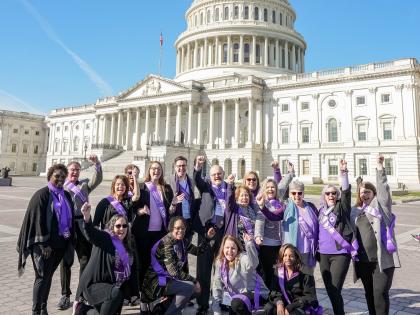Kansas State Alzheimer’s Plan Overview

In May 2019, Governor Laura Kelly signed Executive Order No. 19-08, establishing the Kansas Alzheimer’s Disease Task Force. The Task Force was responsible for assessing the impact of Alzheimer’s disease in Kansas, including the services and resources in place and needed to address the needs of people living with dementia and their caregivers. The Task Force was then tasked with a strategy to mobilize a state response to the Alzheimer’s public health crisis in Kansas. The members were divided into committees that studied, researched and documented: public awareness, access to care, family caregivers, training and workforce, safety and legal, research and data, dementia care, and rural. The Task Force met bi-monthly between the months of August and November of 2019 and in January 2020, published the 2020 Kansas Alzheimer’s Disease Plan. An executive summary was also prepared.
Kansas 2026 Policy Priorities
Requiring Dementia-Specific Training for Guardians
Dementia can have a profound impact on a person’s ability to make decisions that impacts their health and finances. In the absence of advanced directives, people living with Alzheimer’s and other dementia may need the assistance of a guardian or conservator. To understand the disease progression, behaviors and dementia-specific needs of individuals living with dementia who are under a guardianship order, the Alzheimer’s Association is calling on state lawmakers to update state statutes to require guardians who are serving people living with dementia to have dementia-specific training.

Establish Licensing Requirements for Memory Care Units
Individuals living with Alzheimer’s and other dementia make up a significant portion of those using long-term care services. They also have unique needs that often make care delivery and communication more challenging. Some assisted living communities in Kansas offer memory care units for residents living with dementia. However, these units do not have additional licensing requirements that qualify them to deliver specialized care to these residents, causing Kansans in long-term care to pay more each month for services they may not be receiving. The Alzheimer’s Association is urging state lawmakers to support legislation creating a memory care licensing structure for assisted living communities.
Sign Up to Learn About Advocacy Opportunities in Kansas

Find My Chapter
Together, we’re making an impact. Find an Alzheimer’s Association chapter in your community for more ways to engage.
Contact Us
State Affairs Contact: Jamie Gideon
Phone: 316.448.6588
Email: jjgideon@alz.org
54,500
people living with Alzheimer’s in Kansas
90,000
Kansans are providing unpaid care
$589 Million
Medicaid cost of caring for people living with Alzheimer’s (2025)
944
deaths from Alzheimer’s in 2022
18%
in hospice with a primary diagnosis of dementia
91.5%
increase of geriatricians in Kansas needed to meet the demand in 2050
Resources to Drive Change in Kansas
The following resources developed by AIM and the Alzheimer’s Association will help you learn more about the issues impacting people living with Alzheimer’s and their caregivers, how Kansas policymakers are addressing these gaps, and how you can help drive change.